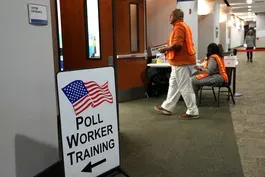
Why executions are rising in America after years of decline
Clip: 10/19/2024 | 6m 18sVideo has Closed Captions
What’s behind a recent rise in executions in America after years of decline
While the execution of a Texas man was temporarily put on hold this week, more than 2,000 people remain on death row across the country. The Texas case has highlighted a recent increase in executions and prompted questions about how capital punishment is applied in the United States. Maurice Chammah, a staff writer for The Marshall Project, joins Ali Rogin to discuss.
Problems with Closed Captions? Closed Captioning Feedback
Problems with Closed Captions? Closed Captioning Feedback
Major corporate funding for the PBS News Hour is provided by BDO, BNSF, Consumer Cellular, American Cruise Lines, and Raymond James. Funding for the PBS NewsHour Weekend is provided by...

Why executions are rising in America after years of decline
Clip: 10/19/2024 | 6m 18sVideo has Closed Captions
While the execution of a Texas man was temporarily put on hold this week, more than 2,000 people remain on death row across the country. The Texas case has highlighted a recent increase in executions and prompted questions about how capital punishment is applied in the United States. Maurice Chammah, a staff writer for The Marshall Project, joins Ali Rogin to discuss.
Problems with Closed Captions? Closed Captioning Feedback
How to Watch PBS News Hour
PBS News Hour is available to stream on pbs.org and the free PBS App, available on iPhone, Apple TV, Android TV, Android smartphones, Amazon Fire TV, Amazon Fire Tablet, Roku, Samsung Smart TV, and Vizio.
Providing Support for PBS.org
Learn Moreabout PBS online sponsorshipJOHN YANG: While the execution of a Texas man was temporarily put on hold this week, more than 2,000 inmates remain on death rows across the country.
The Texas case has highlighted a recent increase in executions and questions about how capital punishment is applied in America.
Ali Rogin has more.
ALI ROGIN: Since the death penalty was reinstated in the 70s and late 80s on the federal level, some 1,600 people have been executed in the US.
This week, Alabama executed Derrick Dearman, responsible for killing five people in 2016.
Dearman had dropped his appeal and asked to be put to death.
This follows five executions in the U.S. in the span of a week in September.
More executions are set to take place before the end of the year in Alabama and at least five other states.
Maurice Chammah is a staff writer for The Marshall Project, a journalism nonprofit focused on criminal justice issues.
He's been covering the death penalty for over a decade, and is the author of the book "Let The Lord Sort Them."
Maurice, thank you so much for joining us.
What is behind the rise in the number of executions that are being carried out?
MAURICE CHAMMAH, Staff Writer, The Marshall Project: There's no one reason.
There's kind of a bunch of factors.
I mean, the Supreme Court is very conservative and is so less likely to stop executions than they used to be, and then you have a lot of Republican state governors and attorneys general who see and it's kind of politically advantageous to pursue executions, especially at a time when former President Donald Trump is running for office, and the death penalty was a favorite of his as well.
ALI ROGIN: One of the more high profile cases right now is that of Robert Roberson in Texas.
On Thursday, his execution was temporarily paused by the state Supreme Court.
Can you tell us about this case and why it's causing some to question what's legally taken into account in these execution cases?
MAURICE CHAMMAH: Yeah, it's a really shocking and unprecedented situation.
Next week, state legislators here in Texas want to bring him to the state capitol to testify.
They issued a subpoena for him, sort of as a 11th hour play to try to stop the execution.
They're concerned, essentially, that the courts did not adequately look at new medical findings in his case.
He would be the first person executed under the theory of Shaken Baby Syndrome, but many now question whether he really killed his daughter or whether her death was an accident.
He's maintained his innocence for more than 20 years.
The case has become a real reckoning over whether the courts are sort of up to the task when the science changes in a case, and whether there's this risk of executing innocent person.
I'll also add that a lot of his supporters are Republicans.
It's been a kind of bipartisan effort on the state legislators part here to step in when they feel like the governor and the state's courts have sort of abdicated their responsibility.
ALI ROGIN: What about the methods used in executions?
Have those changed over the years?
And how has that affected the number of executions that take place?
MAURICE CHAMMAH: This is another reason why executions seem to be going up.
So about 10, 15, years ago, pharmaceutical companies stopped allowing their drugs to be used in executions.
This led to a frenzy among many different states trying to source new combinations of drugs and lots of litigation.
So now some states are looking to fentanyl and ketamine, and then even beyond lethal injection to the firing squad and also to the electric chair, and Alabama recently pioneered the use of nitrogen gas.
ALI ROGIN: There's another high profile case that of Richard Moore of South Carolina.
He's set to be executed on November 1.
What is different about his case, and why is it drawing more attention than other cases?
MAURICE CHAMMAH: Well, Richard Moore was given the option of how he would choose to be executed, between electric chair, lethal injection and firing squad.
He ended up picking lethal injection, but it stands to reason that at any point someone in South Carolina could choose the firing squad, which hasn't been used in more than a decade in the US.
It's very rare, and I think will set off a lot of attention and scrutiny in that state.
Richard Moore himself has also been calling attention to some of the racial dynamics in his case, the fact that there were no black members of his jury, and that the crime that he committed, the murder of a convenience store clerk, was, by his own reckoning, severe, but not, you know, sort of what we would consider the worst of the worst, that there are kind of racial dynamics and geographic dynamics dictating why he's getting executed and others aren't.
ALI ROGIN: And let's talk more broadly about that factor of race.
How does race tend to factor into who is and who isn't executed?
And what does that say about longstanding issues with the capital punishment system?
MAURICE CHAMMAH: Well, death rows across the country are disproportionately black, and the numbers are even more out of whack when you look at the race of victims in capital cases.
So regardless of the race of the perpetrator, if the victim is white, it is more likely to lead to a death sentence.
But beyond these racial disparities, whether someone gets the death penalty seems to have more to do with what county they committed the crime in, who happens to be the district attorney, whether the state leaders are really actively interested in pursuing executions or not, and really, in the context of all of the murders that take place in the United States in any given year, the number of people who are sentenced to death and then executed is just a vanishingly small number.
And when you get really into the weeds of why it's those people, it can feel quite random.
ALI ROGIN: We are just a few weeks away from the November election.
What are the policy differences between former President Donald Trump and Vice President Kamala Harris on this issue?
MAURICE CHAMMAH: So Trump oversaw more executions than any president in decades in terms of federal executions, and he has amused about bringing back guillotines and firing squads and group executions.
Many of these things are outside of the purview of the president and are extremely unlikely, but they suggest a certain appetite for capital punishment.
President Biden campaigned four years ago on a promise to work against the death penalty work to abolish it.
He has not done a whole lot on that front.
And in fact, the Democratic Party dropped the death penalty opposition to it from their platform this year, which suggests that really the ball would be in President Kamala Harris's administration, it would be in her court to really decide.
As a prosecutor in California, there were times when she really opposed the death penalty, and other times when she kind of sped appeals along towards execution.
So it's really anyone's guess what she would do with that power.
ALI ROGIN: Maurice Chammah with the Marshall Project.
Thank you so much.
MAURICE CHAMMAH: Thanks for having me.
Election officials on the threats they’ve faced since 2020
Video has Closed Captions
Election officials speak out on the violent threats and stress they’ve faced since 2020 (7m 51s)
A look at Pennsylvania’s key races in the 2024 election
Video has Closed Captions
A look at the battleground state of Pennsylvania’s key races in the 2024 election (6m 29s)
Providing Support for PBS.org
Learn Moreabout PBS online sponsorshipSupport for PBS provided by:
Major corporate funding for the PBS News Hour is provided by BDO, BNSF, Consumer Cellular, American Cruise Lines, and Raymond James. Funding for the PBS NewsHour Weekend is provided by...













